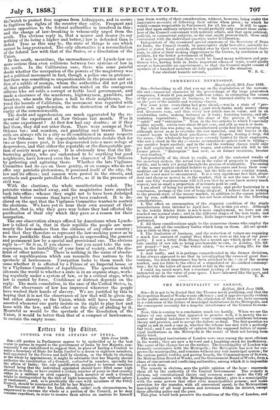trtttr5 to tbt Etitar.
COUNCIL FOR THE AFFAIRS OF INDIA.
25th June 1858. Sin—All parties in Parliament appear to be undecided as to the best course to pursue in regard to the government of India by her Majesty, con- aequently I am emboldened to suggest that, in place of having a Council to assist a Secretary of State for India limited to a dozen or eighteen members, half appointed by the Crown and half by election, or the whole by election or the whole by appointment, it might be advisable that her Majesty should authorize the constitution of a Council, unlimited in number, specially for the affairs of India; the sole qualification required to become members thereof being that the individual appointed should have filled some high situation in India, or have resided a certain number of years in that country either in a military or civil capacity: Each member of such a Council might be distinguished by the title of right honourable, but without salary or emolument ; and, as is practically the case with members of the Privy Council, should be nominated for life by her Majesty.
The Secretary of State for India should, under such circumstances, be empowered to convene the whole or a portion of the Council, as he may consider expedient, in order to receive their advice on matters he himself
may deem worthy of their consideration, without, however, being under the imperative necessity of following their advice when given ; by which he would remain responsible to Parliament for all his acts. It will be appa- rent that upon military subjects he would probably only consult those mein. bers of the Council conversant with military affairs, and that upon political, judicial, or commercial subjects, as the case might present itself, those only conversant with the individual question under deliberation.
Independent of the occasional special summons of the Secretary of State for India, the Council should, by prescriptive right hereafter, assemble to- gether at stated fixed periods, presided over by their own nominated chair- man, to allow of their making suggestions to the Crown, by resolution or by petition, for the better government of India.
It may be presumed that there would be found many noblemen and gen- tlemen who, having held in India important offices of trust, would gladly accept so honourable an appointment ; so that the Council might consist of upwards of a hundred members all duly qualified for the situation.


































 Previous page
Previous page